All the ways the government shutdown is hurting the economy
As the partial federal government shutdown enters into its fifth week, it’s not just the 800,000 federal workers who have been struggling to stay afloat with no income, businesses across all sectors are also feeling the effects.
Here a list of the some of the ways the partial shutdown has been hitting business.
Airline Profits
Delta Air Lines CEO Ed Bastian told CNBC earlier this week that the government shutdown has cost them $25 million in revenue this month.
What’s more, Bastian added the shutdown is preventing them and other airlines from introducing new jets, routes and from hiring new employees as federal officials are needed to sign off on those plans.
The Transportation Security Administration (TSA) union also warned that the shutdown could lead to “massive” airport security risks.
With the doors of the Small Business Administration (SBA) closed, loan applications have been halted for weeks creating a backlog of small businesses waiting for funding. Experts note that it could take several months to recover once the shutdown ends.
No unemployment benefits for some
The Labor Department said Wednesday that furloughed federal workers can collect unemployment benefits during the partial shutdown, but those who are working without pay are ineligible. More than 420,000 federal employees have been deemed essential and required to work without pay since the shutdown began on Dec. 22. However, that number has likely grown as the Internal Revenue Service (IRS) announced this week that it's recalling tens of thousands of workers ahead of tax season.
CLICK HERE TO GET THE FOX BUSINESS APP
Cybersecurity Risks
Cybersecurity experts have been warning citizens and businesses that the government freeze has put the U.S. at risk for cyberattacks.
While data breaches have been a regular occurrence in recent years, with top companies such as Marriott and Facebook all announcing they have been affected by them, a government breach could have far more repercussions.
Mike O’Malley, vice president of strategy at cloud defense firm Radware, told CBS News that “we have laid out the welcome mat to any and all nefarious actors,” and that every government department that has sensitive information that can be used in espionage or fraud would be the hardest hit.




















